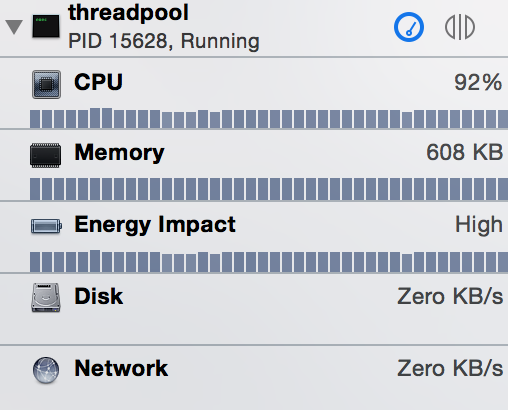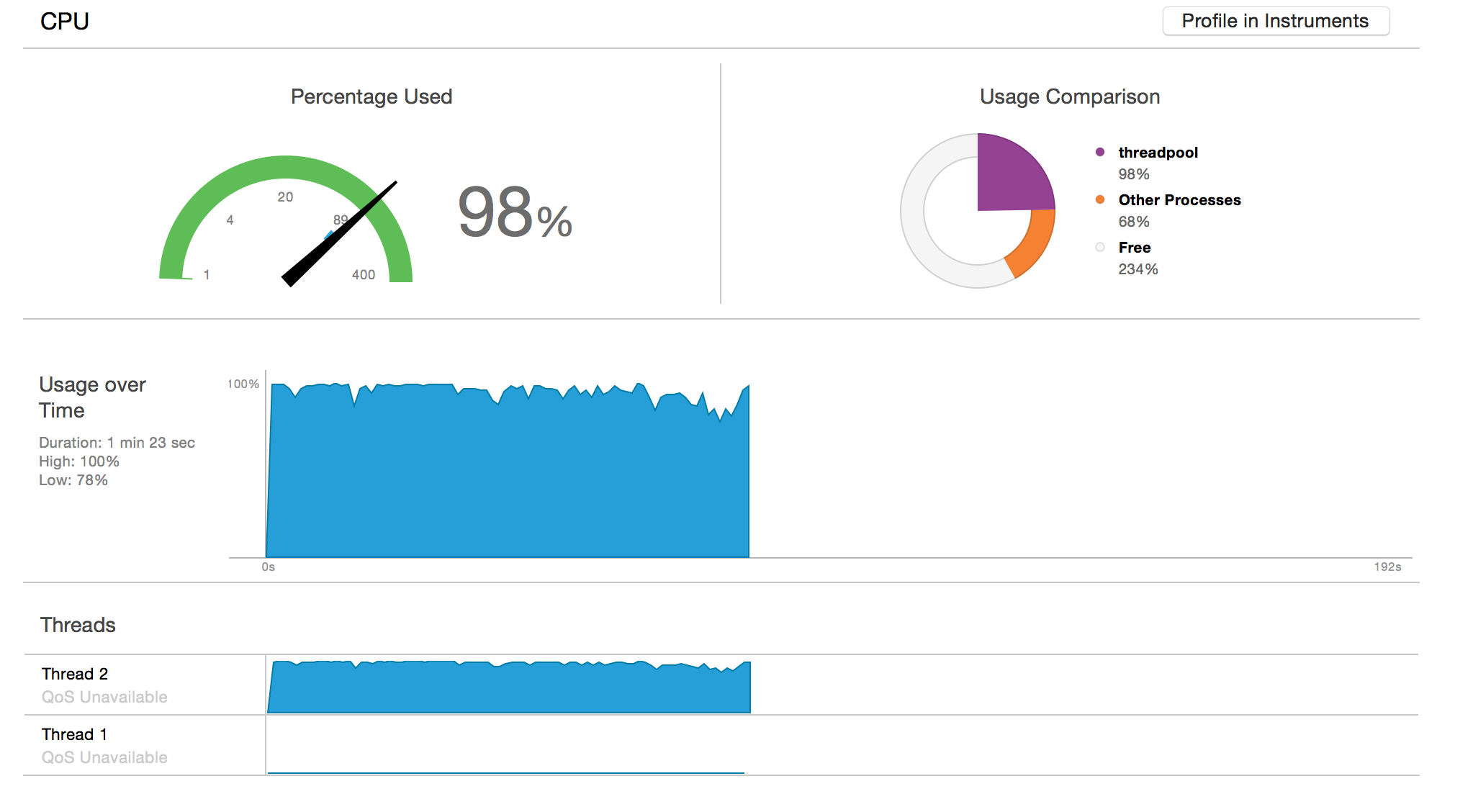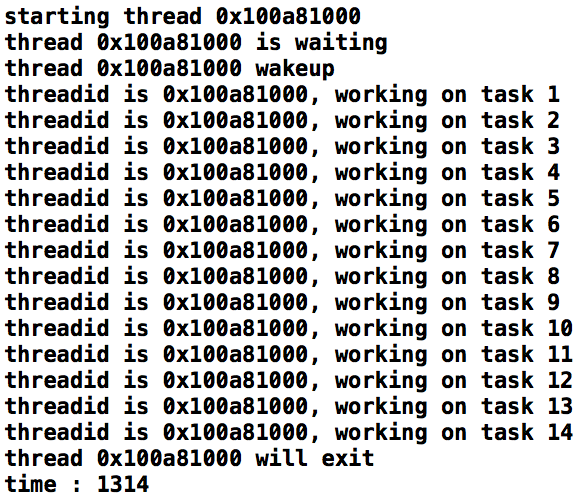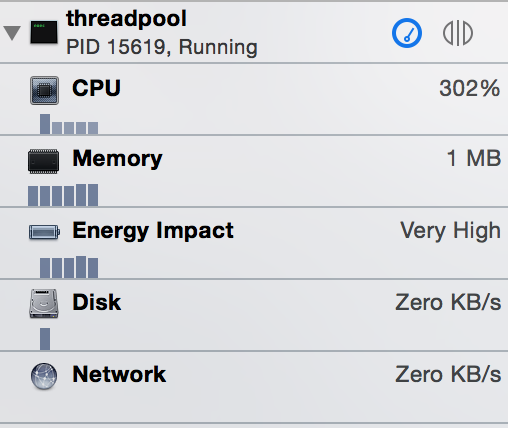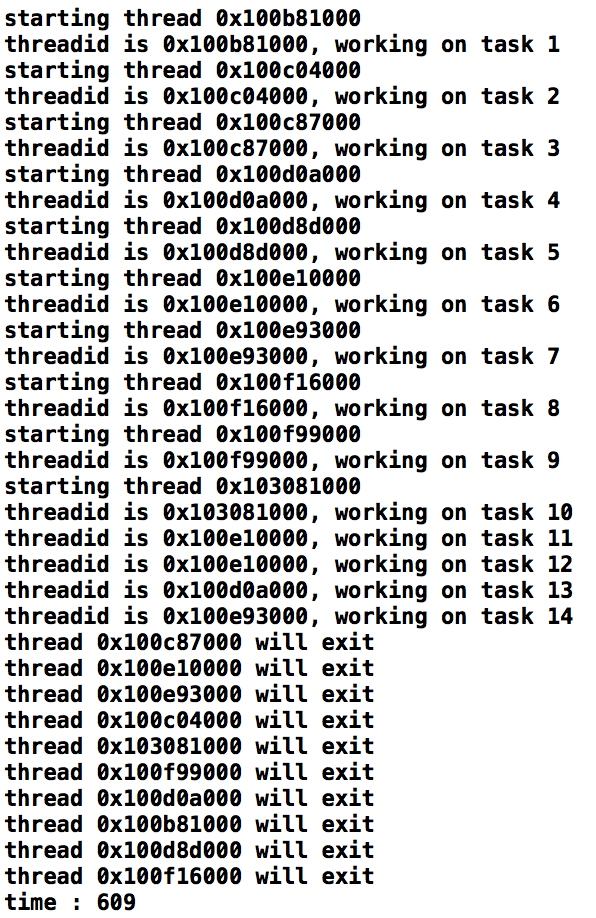1
2
3
4
5
6
7
8
9
10
11
12
13
14
15
16
17
18
19
20
21
22
23
24
25
26
27
28
29
30
31
32
33
34
35
36
37
38
39
40
41
42
43
44
45
46
47
48
49
50
51
52
53
54
55
56
57
58
59
60
61
62
63
64
65
66
67
68
69
70
71
72
73
74
75
76
77
78
79
80
81
82
83
84
85
86
87
88
89
90
91
92
93
94
95
96
97
98
99
100
101
102
103
104
105
106
107
108
109
110
111
112
113
114
115
116
117
118
119
120
121
122
123
124
125
126
127
128
129
130
131
132
133
134
135
136
137
138
139
140
141
142
143
144
145
146
147
148
149
150
151
152
153
154
155
156
157
158
159
160
161
162
163
164
165
166
167
168
169
170
171
172
173
174
175
176
177
178
179
180
181
182
183
184
185
186
187
188
189
190
191
192
193
194
195
196
197
198
199
200
201
202
|
#include <iostream>
#include <assert.h>
#include <pthread.h>
#include <unistd.h>
#include <time.h>
#define MIN(a, b) (a > b ? b : a)
#define MAX(a, b) (a < b ? b : a)
typedef long long ll;
typedef struct worker{
void *(*process) (void *arg);
void *arg;
struct worker *next;
} CThread_worker;
typedef struct{
pthread_mutex_t queue_lock;
pthread_mutex_t input_lock;
pthread_cond_t queue_ready;
CThread_worker *queue_head;
int shutdown;
pthread_t *threadid;
int max_thread_num;
int cur_queue_size;
} CThread_pool;
static CThread_pool *pool = NULL;
int pool_add_worker (void *(*process) (void *arg), void *arg){
CThread_worker *newworker = (CThread_worker *) malloc (sizeof (CThread_worker));
newworker->process = process;
newworker->arg = arg;
newworker->next = NULL;
pthread_mutex_lock (&(pool->queue_lock));
CThread_worker *member = pool->queue_head;
if (member != NULL){
while (member->next != NULL)
member = member->next;
member->next = newworker;
}else{
pool->queue_head = newworker;
}
assert (pool->queue_head != NULL);
pool->cur_queue_size++;
pthread_mutex_unlock (&(pool->queue_lock));
pthread_cond_signal (&(pool->queue_ready));
return 0;
}
void* thread_routine (void *arg){
fprintf (stderr, "starting thread 0x%lx\n", (unsigned long)pthread_self ());
while (1){
pthread_mutex_lock (&(pool->queue_lock));
while (pool->cur_queue_size == 0 && !pool->shutdown){
fprintf (stderr, "thread 0x%lx is waiting\n", (unsigned long)pthread_self ());
pthread_cond_wait (&(pool->queue_ready), &(pool->queue_lock));
fprintf (stderr, "thread 0x%lx wakeup\n", (unsigned long)pthread_self ());
}
if (pool->shutdown){
pthread_mutex_unlock (&(pool->queue_lock));
fprintf (stderr, "thread 0x%lx will exit\n", (unsigned long)pthread_self ());
pthread_exit (NULL);
}
assert (pool->cur_queue_size != 0);
assert (pool->queue_head != NULL);
pool->cur_queue_size--;
CThread_worker *worker = pool->queue_head;
pool->queue_head = worker->next;
pthread_mutex_unlock (&(pool->queue_lock));
(*(worker->process)) (worker->arg);
free (worker);
worker = NULL;
}
}
void pool_init (int max_thread_num){
pool = (CThread_pool *) malloc (sizeof (CThread_pool));
pthread_mutex_init (&(pool->queue_lock), NULL);
pthread_mutex_init (&(pool->input_lock), NULL);
pthread_cond_init (&(pool->queue_ready), NULL);
pool->queue_head = NULL;
pool->max_thread_num = max_thread_num;
pool->cur_queue_size = 0;
pool->shutdown = 0;
pool->threadid = (pthread_t *) malloc (max_thread_num * sizeof (pthread_t));
for (int i = 0; i < max_thread_num; ++i){
pthread_create (&(pool->threadid[i]), NULL, thread_routine, NULL);
}
}
int pool_destroy (){
if (pool->shutdown) return -1;
pool->shutdown = 1;
pthread_cond_broadcast (&(pool->queue_ready));
for (int i = 0; i < pool->max_thread_num; i++)
pthread_join (pool->threadid[i], NULL);
free (pool->threadid);
CThread_worker *head = NULL;
while (pool->queue_head != NULL){
head = pool->queue_head;
pool->queue_head = pool->queue_head->next;
free (head);
}
pthread_mutex_destroy(&(pool->queue_lock));
pthread_cond_destroy(&(pool->queue_ready));
free (pool);
pool = NULL;
return 0;
}
struct Data{
int test_case;
int N;
ll X[3000];
ll Y[3000];
ll ans[3000];
}data[101];
int handleInput(int index){
pthread_mutex_lock (&(pool->input_lock));
scanf("%d", &data[index].N);
int N = data[index].N;
for (int i = 0; i < N; ++i){
scanf("%lld %lld", &data[index].X[i], &data[index].Y[i]);
}
pthread_mutex_unlock (&(pool->input_lock));
return 0;
}
void* mythread (void* arg){
fprintf (stderr, "threadid is 0x%lx, working on task %d\n", (unsigned long)pthread_self (),*(int *) arg);
handleInput(*(int *) arg);
int index = *(int *) arg;
int N = data[index].N;
for (ll i = 0; i < N; ++i){
ll mi = N - 1;
for (int j = 0; j < N; ++j){
if (j == i)continue;
ll x1 = data[index].X[i], x2 = data[index].X[j];
ll y1 = data[index].Y[i], y2 = data[index].Y[j];
ll a = y2 - y1;
ll b = x1 - x2;
ll c = x2 * y1 - x1 * y2;
ll num1 = 0 , num2 =0;
for (ll k = 0; k < N; ++k){
if (k == i || k == j)continue;
ll value = a * data[index].X[k] + b * data[index].Y[k] + c;
if (value > 0){
num1++;
}else if(value < 0){
num2++;
}
}
mi = MIN(mi, num1);
mi = MIN(mi, num2);
}
data[index].ans[i] = mi;
}
return NULL;
}
int main(int argc, const char * argv[]) {
time_t start = time(NULL), end;
pool_init (1);
freopen("/Users/apple/Documents/coding/Xcode/Google Code Jam/threadpool/threadpool/C-large-practice.in.txt", "r", stdin);
freopen("/Users/apple/Documents/coding/Xcode/Google Code Jam/threadpool/threadpool/output2.txt", "w", stdout);
int T; scanf("%d", &T);
for (int i = 1 ; i <= T; ++i){
data[i].test_case = i;
}
for (int i = 1; i <= T; ++i)
{
pool_add_worker (mythread, &data[i].test_case);
}
while(pool->cur_queue_size)sleep(1);
pool_destroy ();
for (int i = 1; i <= T; ++i){
printf("Case #%d:\n", i);
for (int j = 0; j < data[i].N; ++j){
printf("%lld\n", data[i].ans[j]);
}
}
end = time(NULL);
fprintf(stderr, "time : %ld", (end - start));
return 0;
}
|
